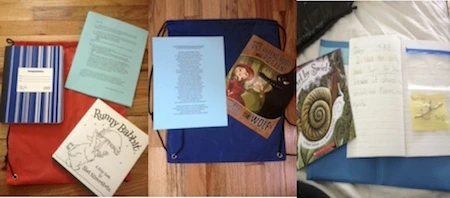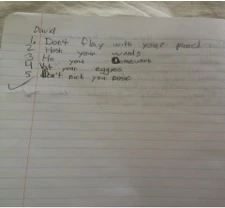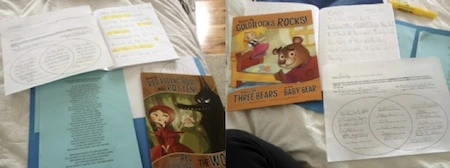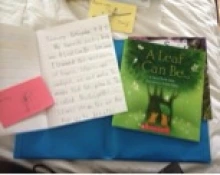Global Themes in Poetry Backpacks
By Stephanie Annunziata
When we sat down last fall at our first Teacher Talk meeting of the school year, the Common Core State Standards already had a very firm grasp on my attention. I was learning about the standards and trying to understand how to fit them into my classroom without compromising what was already happening there. Along with my own interest, I was getting a lot of inquiries from parents asking about the standards and what it meant for their child both at school and at home.
After much conversation, our Teacher Talk group decided that we would focus our discussions on exploring the Common Core Text Exemplar List and how to go beyond it to include global children’s literature. We felt that this was important for students in order to develop ideals of global thinking, while still meeting the requirements of the standards. I found several texts with global themes, which, based on Lexile level and genre, fit into the Common Core Text Exemplars. These books were based on common global themes and situations, such as losing a tooth, helping in times of need, and acts of kindness. I shared these books with my class both as read aloud selections and discussion books. We used these books to make connections to personal experiences, current events, and to other books.
As the year progressed, I decided not only to try and expose my students to global literature equivalent to the ones on the exemplar list in terms of text complexity, but to also include their families in this adventure. I started by providing book suggestions in our monthly newsletter. As long as they visited the library or bookstore and read the books, this took care of exposing them to global literature; however, I realized that this exposure alone wasn’t helping to facilitate discussions that supported global thinking and the key concepts of thinking related to the Common Core Standards. As poetry month approached, I decided I would use a new approach with poetry as a vehicle to achieve this.
This past year I taught in a multi-age classroom (grades 1-3) with 25 students. I had several reading and foundational reading groups with about five children in each group. I wanted to create something that would enable each child to have a chance to share the poetry books that we were reading and investigating in school with their family members. I wanted them to engage with poetry and to discuss these books with their families to create a deeper understanding and enjoyment of them. So, after much thinking, I came up with poetry backpacks. Each backpack, or drawstring bag, consisted of one or two poetry books representing a global theme, a notebook for responses, a family letter, and an activity.

One child in each group would take the backpack home for an entire week to read the poems, complete the activities, and engage in discussions with their families. Each grade level backpack focused on a different global theme and a standard of the Common Core English Language Arts Standards.

The third grade’s backpack focused on the work of Shel Silverstein and his humorous poems. Their pack focused on third grade foundational reading skills. The students engaged in word recognition and fluency standards, as they created their own “Runny Babbit-isms” (shown above). They were encouraged to discuss their favorite poems with their families citing lines directly from the stanzas.
The second grade’s backpack focused on the global theme of fairytales. The fairytales I selected are classic fairytales told from different points of view. I asked my students to compare and contrast two different texts, a poem and a book, as well as to write an opinion piece as to which they enjoyed best and why. They were encouraged to re-tell the stories verbally to their family members from their point of view, as if they were a character in the story.

The first grade’s backpack focused on the global theme of nature and its patterns. They were asked to go on a scavenger hunt and find spirals in nature and document them using both a camera (included in the pack) and their notebook to descriptively write about them. They were encouraged to find and discuss with their families different elements in nature and how they might be helpful to our environment.

In the end, these backpacks created a wealth of excitement about poetry and reading both inside and outside my classroom. They helped the families of my students understand a little more about the Common Core State Standards and how to have meaningful discussions about books guided by those Standards and they helped my students to learn how to engage in a deeper way with books outside the classroom. They also created a poetry explosion that crossed over almost every curriculum in my classroom. The children were especially eager to write their own poems and create their own books for our classroom library. We even devoted an entire day to the reading, writing, and sharing of poetry. I definitely intend to keep up with these backpacks next year filling them with different genres and subject areas. This project encouraged me to go beyond the exemplar list, and, as I did, it opened the door to accessible global literature that meets the standards of the Common Core.
Excerpts of Poetry Taken From:
Dahl, R. (2009). Revolting rhymes. New York: Puffin.
Bibliography of Books in Poetry Backpacks
First Grade Poetry Backpack:
Lyon, G. E. (2011). All the water in the world. New York: Atheneum.
Salas, L. P. (2012). A leaf can be… New York: Scholastic.
Sidman, J. (2011). Swirl by swirl. New York: Scholastic.
Second Grade Poetry Backpack:
Loewen, N. (2012). Believe me, Goldilocks rocks! Minnesota: Picture Window.
Shaskan, T. S. (2012). Honestly, Red Ridding Hood is rotten! Minnesota: Picture Window.
Third Grade Poetry Backpack:
Silverstein, S. (2005). Runny babbit: A billy sook. New York: Harper Collins.
After many years as a kindergarten teacher, Stephanie Annunziata is co-teaching in a 1st-3rd multi-grade classroom in Our Lady of Grace Montessori School, Manhasset, NY.
WOW Stories, Volume IV, Issue 6 by Worlds of Words is licensed under a Creative Commons Attribution-NonCommercial-ShareAlike 4.0 International License. Based on a work at https://wowlit.org/on-line-publications/stories/storiesiv7.










